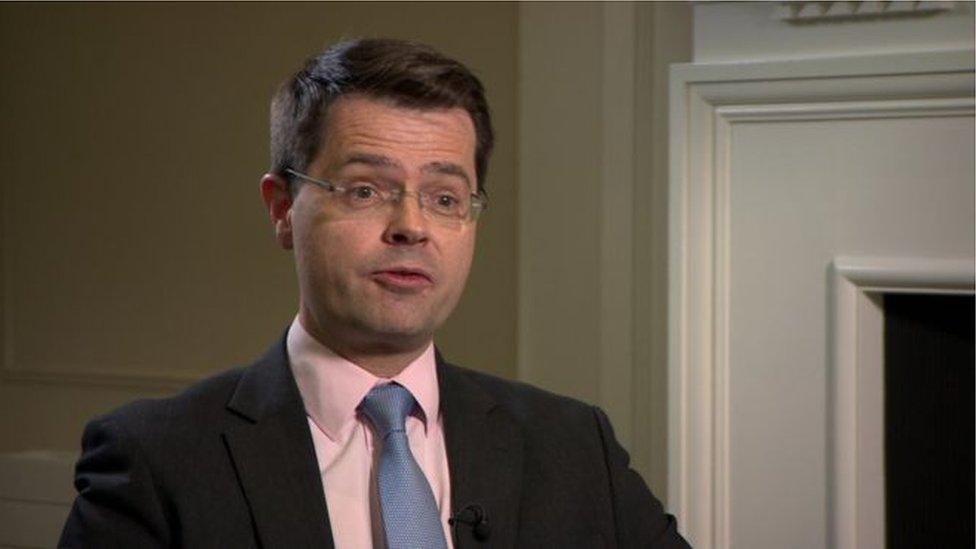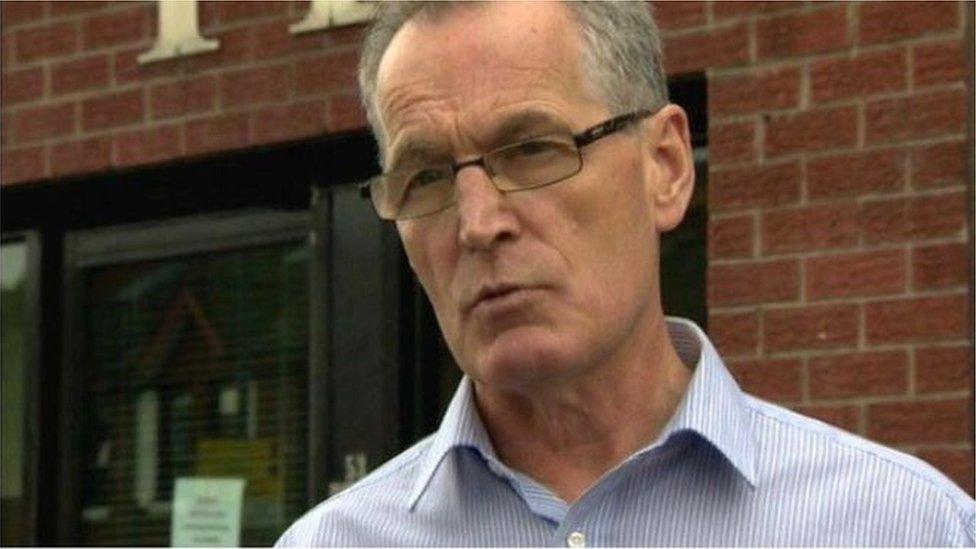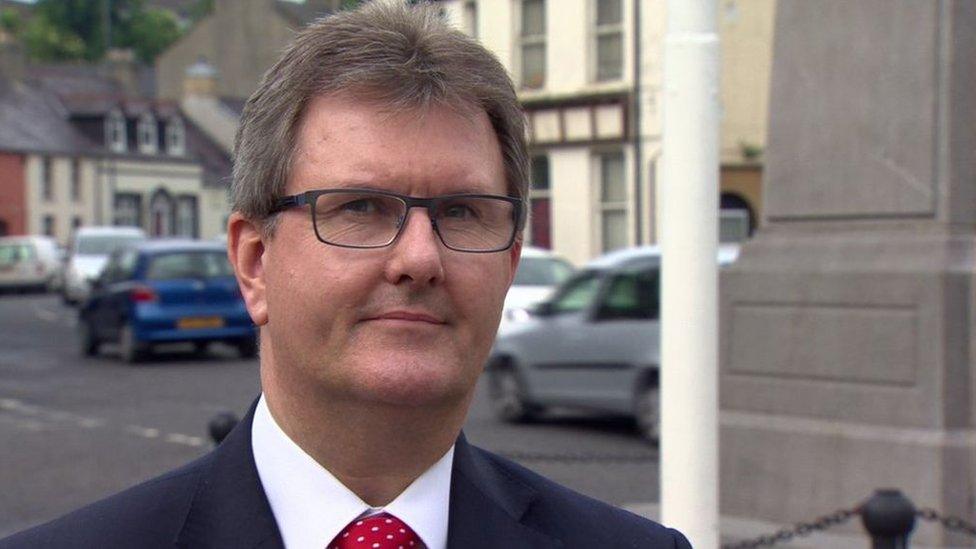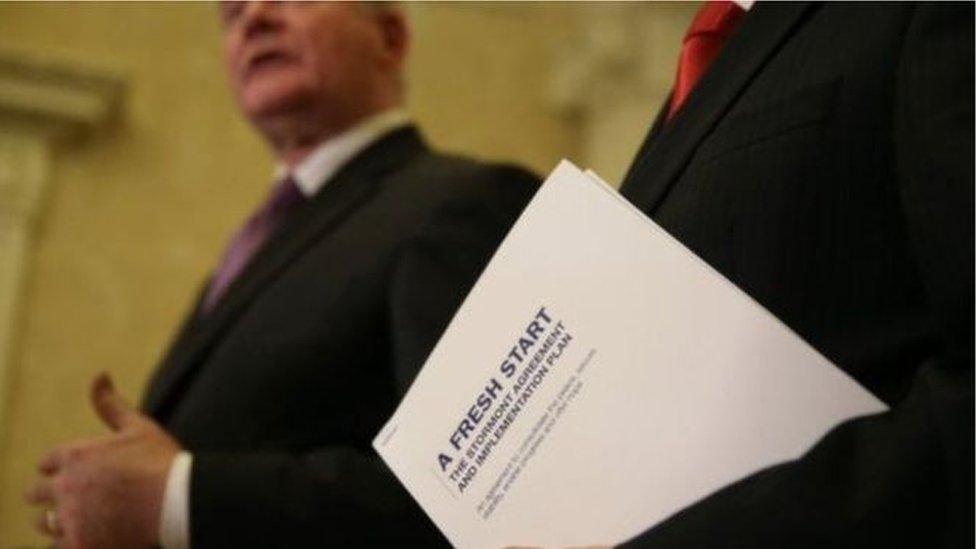Legacy plans on hold because of lack of agreement
- Published

James Brokenshire said he would not proceed with a public consultation on the issue until he achieved political consensus
Plans for dealing with the legacy of the Troubles appear to have been been put on hold indefinitely because of a lack of political agreement.
Secretary of State James Brokenshire has said he will not proceed with a public consultation on the issue until he achieves political consensus.
There is no sign that an agreement is close.
The British government and DUP are at loggerheads with republicans over the issue.
In an interview with the BBC, James Brokenshire indicated that he did not believe there was any point holding a consultation at this stage.
"No-one will thank me for coming forward with something that simply then would be stopped in its tracks at that first phase," he said.
The main points of disagreement are the issue of national security and a proposal for funding inquests into some of the most controversial killings of the Troubles.
The term "national security" refers to information the government and security agencies argue is too sensitive to be put into the public domain.
Sinn Fein has argued it is being used as an excuse for protecting former soldiers and police officers from investigation and possible prosecution.

Sinn Féin MLA Gerry Kelly said it was appalling the money had not yet been released
Policing Board member and North Belfast MLA Gerry Kelly is a member of Sinn Fein's team taking part in negotiations about how to deal with the past.
He told the BBC the fact that national security was being used to prevent the release of information was illustrated by the government's attitude to releasing details about the McGurk's Bar bombing in 1971, in which 15 Catholics were killed in a UVF attack.
"If you want to make a judgement on where the British government is, or where James Brokenshire is, then look at the McGurk's bar bombing," he said.
"The families have been waiting this length of time, 45 years, for this.
"They've (the government) just said that there is information and evidence which will not be released to the public until 2056.
"That means they will have to wait 85 years. They are clearly waiting for people to die."
"Keenly felt'
The Secretary of State rejected that claim.
"I hold my duties very clearly in relation to national security, on protecting the public here in Northern Ireland here and now, and I feel that very keenly," he said.
"National security is used for that purpose, it is not about some sort of mechanism of hiding embarrassment."

DUP MP Sir Jeffrey Donaldson said Sinn Fein must compromise
'Compromise'
The government's position is supported by the DUP.
"Sinn Féin are being unreasonable on national security," said Sir Jeffrey Donaldson MP, one of the party's negotiators on legacy.
"They are making demands that they know the government legally cannot meet and I think Sinn Féin need to recognise the need for compromise.
"They're calling for others to compromise, on this issue Sinn Fein must compromise."
The two parties also disagree strongly about the approach to dealing with legacy inquests into some of the most controversial killings of the Troubles.
The DUP supports the government's position, which is that there needs to be a "holistic" approach to dealing with the past.
First Minister Arlene Foster has blocked a request from Lord Chief Justice Sir Declan Morgan for funding for a five-year programme to hear more than 50 legacy inquests.
"Our job is to sort out all of the legacy issues and not just some," said Sir Jeffrey Donaldson.
"We are not prepared to move forward on a partial basis, where a small number of victims have a privileged position, where they have funding and access to justice and the vast majority of the victims and survivors in over 3,000 have no access to justice."
'Appalling'
Sinn Féin has been heavily critical of the Secretary of State for refusing to use legal powers he has to unilaterally release the funding sought by Sir Declan Morgan.
The party said its partner in government, the DUP, also bears responsibility.
"We have a Lord Chief Justice who has brought forward a plan, he has already moved on it, he appointed judges and said he needs the funding, that he can do it in five years," said Gerry Kelly.
"That is the best news that families involved in coroners courts have heard in the last 40 and more years, and yet they will not release the money to do that. I find that appalling."
There is little sign of agreement on the the issues any time soon, with each side blaming the other for placing obstacles in the way of progress.
"On the key issues of trying to unlock this, then the British Government are the main blockage and they are hiding behind, sometimes they hide behind unionism, and sometimes unionism hides behind them," said Gerry Kelly.
Sir Jeffrey Donaldson sees it very differently.
"The people who are not acting in good faith right now, the people who are delaying progress, the people who are standing in the way of the victims having access to justice are Sinn Fein, and Sinn Fein alone," he said.
- Published12 December 2016
